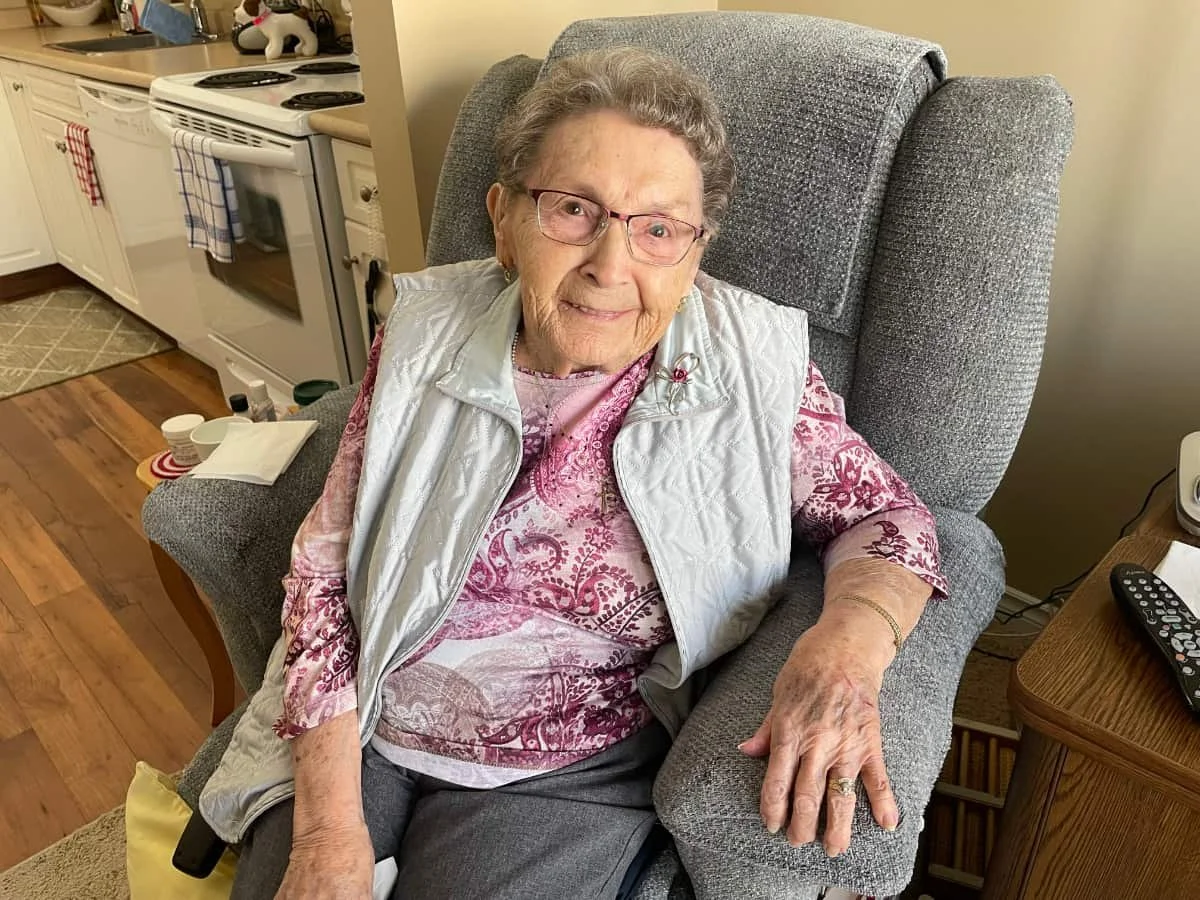Caleb resident shares childhood memories
By Joan Janzen
The lifestyles of people on the prairies were much different back in 1926. That’s the year Queen Elizabeth II, and Marilyn Monroe were born; it’s also the year Jovita Schiebelbein was born near Bodo, AB. Jovita currently resides at Caleb Village in Kindersley and recalled her memories from a long-forgotten era.
Although she was given a Spanish name, Jovita says she explains to everyone who asks that she’s just a “plain old country girl.” She was born the fifth child among her twelve siblings. She had three sisters and nine brothers in her family.
Jovita Schiebelbein resides at Caleb Village in Kindersley and will be celebrating her 97th birthday in March.
When she was two years old, the family moved to a farm near Major, Sask. “I started school in Major, which was three and a half miles from our farm,” she explained. “Quite often, we travelled to school on foot when the horses were needed out in the field.” A few years later, the family moved to a farm north of Major, where Jovita attended a country school located just a quarter mile from their home.
When I asked if they had a garden on their farm, Jovita’s enthusiastic reply was, “Oh, did we ever! We had a huge garden! The back half was about six rows of strawberries, and we planted enough potatoes for all of Saskatchewan. There was lots of weeding and canning; I learned all that very early.”
It seems the garden was her father’s idea, and Jovita recalls straw piled on the pathways to help eliminate weeds. “My father had all these ideas, but he wasn’t there to do the work,” Jovita said.
She also recalls the Dirty 30s when the government sent “ugly fish” (as she called it) to the people in Saskatchewan. “We stored it in a grain bin under the wheat; that’s where everybody stored it,” she recalled. “We ate it on Fridays. That’s why I don’t eat fish to this day.”
Fortunately, the family also raised cows and hogs on the farm for meat. The farmers took turns butchering an animal, with each farmer taking home a portion of the meat. “We always had beef and pork and chickens, of course,” she said. “As kids, when you wanted chicken, you ran one down, and you had chicken for supper. Nothing was easy back then. You didn’t go to the Co-op and buy a chicken.”
Homemade bread was another food staple for the family, and she remembers the huge bread bowl filled with dough. “A batch of bread lasted for a whole week,” she recalled. “We had an English teacher who came to our place and tasted the homemade bread. After that, he was a regular Thursday night visitor, coming for the fresh bread.”
There’s nothing better than warm bread smothered with butter, and Jovita remembers when a pound of butter cost only twenty cents. That’s quite a change from present-day prices.
Clothes for the family were ordered from the Eaton’s catalogue. “We had dress clothes, school clothes and chore clothes,” she said. “We ordered the clothes from Winnipeg, and in a week, we got the parcel.”
The family worked hard, but they took time to have fun and visit with neighbours. “We had a lot of company on Sundays. We had so many people at our place, and we played ball,” she said. “As little kids, we learned how to play cards. To this day, I like playing cards and cribbage. I don’t like to miss a Kaiser or crib tournament.”
During her years of growing up, the family didn’t travel far from home. Roads weren’t good and were covered with snow in the winter. “We went by train to Kerrobert for a doctor’s appointment,” she said.
As a teen, Jovita had wanted to become a nurse, but that would have required her to go to school in Denzil. “Just the thought of going that far from home in those days was intimidating for me, so I just quit,” she explained.
Jovita married a farmer, and the couple raised seven children. “One girl and a whole mess of boys,” Jovita said. In March, Jovita will celebrate her 97th birthday. Thanks, Jovita, for sharing your memories with us.

